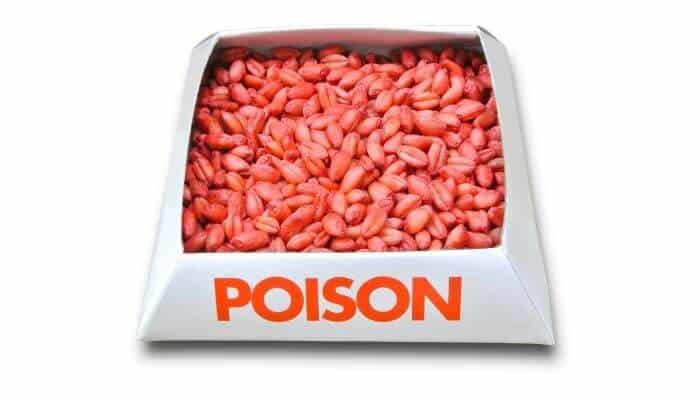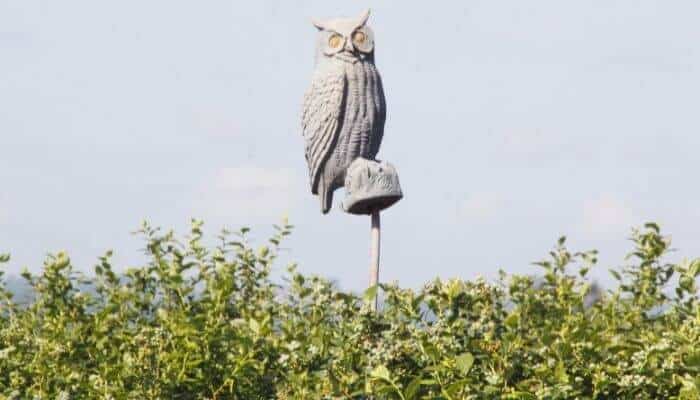Rat poison is designed to exterminate rodents (rats and mice) in your vicinity, but if a pigeon, or any bird for that matter, consumes the poison, it is going to be fatal.
The wider issue is that rat poison is also fatal to other birds and wildlife as well as pets and it can make humans – especially children – very sick.
Why Would People Want to Poison Pigeons?
Without a doubt, one of the most divisive animals in terms of like versus dislike among the general population is pigeons.
Whilst some people love pigeons and revere them for their many special talents and quirks, others see them simply as a pest that makes too much of a mess in urban areas and congregate in large groups that can be annoying when you have some attractive looking lunch to eat outdoors!
Some people think they scare away other birds from their gardens and feel unable to put out food to attract smaller birds and there are also pigeon owners who would prefer not to have their own pigeons mix with feral pigeons.
Most people are able to just ignore the presence of pigeons if they don’t enjoy them, but sometimes it is felt the pest problem is perceived to be too much.
Commonly and unfortunately, this frustration leads to someone resorting to poisons and toxic deterrents that not only keep the pigeons away, but also harm or even kill them.
What is Rat Poison?
Officially known as rodenticide, rat poison is a chemical solution to get rid of rats and mice. It consists of chemicals and a delivery mechanism.
Types of rat poison are acute poisons, calcium releasers and anticoagulants.
Many acute toxins are no longer available for domestic use because they had previously been involved in many cases of accidental poisoning.

Pets and wild animals could accidentally eat the poison but some acute toxins can also cause death if an animal eats a poisoned rat/mouse.
Only one acute toxin – bromethalin – is considered safe for use in residential areas. Zinc phosphide is one of the most common toxins used in agriculture.
Rat poison is sold in various forms including pellets, powders that need to be dissolved in water, seeds or grains treated with the poison, or blocks of paraffin.
The different types of poison work in different ways.
Of the acute toxins, Bromethalin shuts down the animal’s ability to produce energy. Zinc phosphide works by the fatal build-up of toxic gases in the animal’s stomach acid.
Calcium releasers such as concentrated Vitamin D3 cause organ failure because of the increase of calcium.
Anticoagulants cause internal bleeding. These are probably the least effective or guaranteed to be successful because the rodent is required to consume several doses.
Any type of proprietary rat poison should be used with care in domestic situations. According to pest control experts, it should be a last resort if trapping hasn’t worked.
It certainly shouldn’t be used as a pigeon repellent as there is too great a chance of it killing any other birds, wildlife and pets. Poisoning pigeons can also be a very inhumane and cruel method of dealing with them too.
Even if you use a tamper-proof bait station, there is always the risk that other birds and wildlife can access the poison even though it is unlikely that pets and people can/will.
Poison pellets should never be simply scattered about, especially where there is a chance of children coming across them. The pellets are often brightly colored and flavored and therefore look like sweets or candy.
How Can You Deal with Pigeons Humanely?
If you want to deter pigeons from your commercial premises or your agricultural land, you’ll probably need to consult professional pest control services.
There are laws in the UK and USA governing the methods of controlling pests including pigeons.

If you want to remove the prospect of any poison-related incidents in your garden, then there are other, less toxic alternatives to rat poison to deter pigeons.
Here are some of the more humane pigeon deterrents you could try:
- Larger Bird Decoys
Pigeons are natural prey to a number of larger birds, so one of the simplest deterrents is decoy birds. These are statues of birds like hawks, owls and crows. These can be fairly rudimentary and inexpensive, but as long as they look vaguely like a steely-eyed hawk or a menacing owl, then they will most likely get the job done! If a pigeon thinks that a predator is nearby, it won’t come close.
- Electronic Sound Deterrent
These clever devices can be installed in your garden, and they emit an incredibly high-pitched sound that, whilst inaudible to humans, is very distracting and unpleasant for passing birds. If a pigeon gets too close, the sound sends the bird flying off to somewhere more hospitable.
- Bird Repellent Gel
If pigeons congregate on your property walls, then you can buy a type of gel to line those walls with that feels sticky to the touch. When landing on these walls, the pigeon will feel as though it is getting trapped and the bird’s natural instinct is to remove itself from the risk.
The gel won’t permanently trap the pigeon in place on the wall, but it will cause it to move away and find a spot that doesn’t feel so unsafe.
- Bird Nets
Bird nets are easy to install, and they will certainly prevent birds from being able to get through the mesh to whatever it is that you are hoping to protect, be it newly sown lawn seed, fruit bushes or vegetable patches.
There are other humane and inhumane (spikes e.g.) options out there for deterring pigeons in your garden so the important thing to remember is that you don’t have to resort to poisons that are very difficult to control precisely.
Pigeons (and other unsuspecting birds) don’t deserve to come along hoping for a tasty snack and end up ingesting something nasty that was intended for a mouse or a rat, so our advice is to stay away from toxic ingredients and opt instead for one of the many clever ideas that bird-conscious inventors have come up with over the years.
